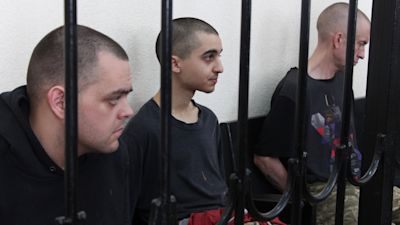Liz Truss to discuss captured Britons’ death sentences with Ukrainian counterpart

The Foreign Secretary will speak with her Ukrainian counterpart about the case of two Britons sentenced to death by pro-Moscow officials for fighting Russian soldiers during the war.
Aiden Aslin, 28, from Nottinghamshire and Shaun Pinner, 48, from Bedfordshire, were convicted of taking action towards violent seizure of power at a court - which is not internationally recognised - in the self-proclaimed Donetsk People’s Republic (DPR).
A third man, Moroccan national Saaudun Brahim, was convicted alongside Mr Aslin and Mr Pinner.
The men were accused of being “mercenaries” after fighting with Ukrainian troops.
Liz Truss has called it a “sham judgement” and insisted it has “absolutely no legitimacy”.
She is expected to discuss the situation with Ukraine's Foreign Minister Dmytro Kuleba by phone later on Friday, according to the BBC.
Ukrainian Foreign Ministry spokesman Oleh Nikolenko condemned the proceedings as legally invalid, saying "such show trials put the interests of propaganda above the law and morality”.
He said that all foreign citizens fighting as part of Ukraine’s armed forces should be considered Ukrainian military personnel and protected as such.
As the diplomatic fallout intensified, No 10 said the men are entitled to combatant immunity as prisoners of war under the Geneva convention, with the ruling condemned by top British officials.
The Foreign Secretary said: “I utterly condemn the sentencing of Aiden Aslin and Shaun Pinner held by Russian proxies in eastern Ukraine.
“They are prisoners of war. This is a sham judgment with absolutely no legitimacy.
“My thoughts are with the families. We continue to do everything we can to support them.”
A No 10 spokesman expressed concern over the situation, warning "that prisoners of war shouldn’t be exploited for political purposes".
"We will continue to work with the Ukrainian authorities to try to secure the release of any British nationals who were serving in the Ukrainian armed forces and who are being held as prisoners of war.”
Interfax, a Russian news agency, claimed the men would be able to appeal against their convictions.
Mr Aslin, originally from Newark-on-Trent in Nottinghamshire, and Mr Pinner were both members of regular Ukrainian military units fighting in Mariupol, the southern port city which was the scene of some of the heaviest fighting since Vladimir Putin’s invasion of Ukraine.
Tory former minister Robert Jenrick, who represents the Newark constituency where Mr Aslin lived, called for the Russian ambassador to the UK to be summoned to the Foreign Office.
It comes after a friend of Mr Aslin told ITV's Good Morning Britain he didn't think the death sentences would be carried out.
Want a quick and expert briefing on the biggest news stories? Listen to our latest podcasts to find out What You Need To Know
Brennan Phillips, an American former soldier who met Mr Aslin in Syria and worked alongside him in Ukraine, said he has "hope" the men would be released.
He told GMB: "Emotionally, I worry about it, but logically I think about it and I do not think they'll be executed. I do think they'll be released, I have hope for that".
On Thursday, ITV News Europe Editor James Mates reported on the capture of the three men and its diplomatic significance in the war in Ukraine
Mr Phillips said Mr Aslin was not a mercenary but "a Ukrainian," adding: "He signed up for the Ukrainian marine corp, he has a fiancee, a home here."
He added: "He's a humble guy, heart of gold".
Conservative MP Bob Seely, who sits on the foreign affairs select committee, accused Russia of breaking international law.
“I very much hope they are not killed quickly – they may be killed quickly as shock value,” the Isle of Wight MP said.
“But if, as everyone expects, they are not then they will be held as a diplomatic tool and I think the bigger picture here – what is happening – is that the Russians are going to become increasingly aggressive as part of the indirect conflict against the Baltic republics, against the Poles, against the UK and others who are close to the Ukrainian government and are supporting the Ukrainians in the conflict.”